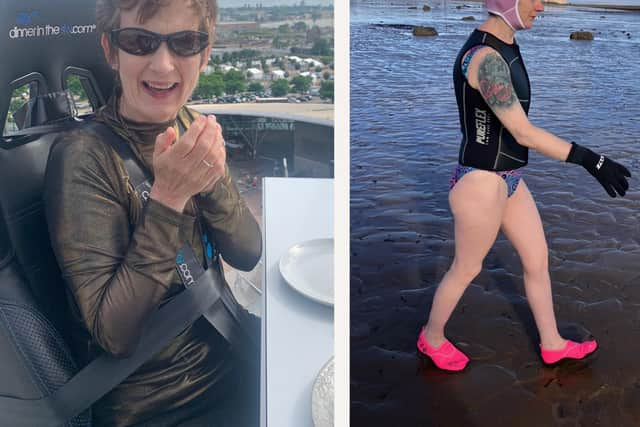MS Awareness Week: how cold water swimming helped a Fife mum’s MS symptoms
and live on Freeview channel 276
Linda Simpson, from St Andrews, was diagnosed with MS in 2016 but had experienced symptoms for 13 years prior to that. The 49-year old now has secondary progressive MS which causes her problems with walking - she describes her balance as “dreadful” - and she also experiences bladder and bowel issues. Linda also temporarily lost her eyesight in 2003.
The mum of three discovered the benefits of sea swimming by accident after deciding to take a dip one day out of curiosity. She hasn’t looked back since and joins other members of the St Andrews Swimmers at East Sands at least once a day between May and December.
Advertisement
Hide AdAdvertisement
Hide AdNow Linda is joining MS Society Scotland to raise awareness of what MS is and how it can affect people as part of MS Awareness Week 2023.


Linda, who used to work as a fitness instructor and still teaches a seated exercise class, said: “During lockdown I still wanted to get out and get some fresh air. My dear friend Susan used to take me for a walk along the beach. We used to see these sea swimmers and I would think: ‘look at these crazy mad people!’
“We kept walking past and we thought: ‘Maybe we should join them!’”
The pair bought wetsuits and before long Linda was a regular member of the group.
Advertisement
Hide AdAdvertisement
Hide AdShe continued: “The first time I did it, as I first went in, I did ask myself what on earth I was doing, but the benefits far outweigh the downside. You just feel so wonderful. We only went in for a few minutes to start with and the next time went in for a little bit longer - it’s great! I felt good after that first time. It was amazing, and I slept virtually all night.
“ I have problems sleeping. I have problems with my bladder and have to get up in the night to go to the toilet but that first night I had no problems. I just felt so good.
“And in the water, because you’re not having to balance, my MS goes – I don’t have MS in the water.”She said it was also good for her mental wellbeing - when she stopped doing it in December she was really down for weeks.
“I also have anxiety and because I’m not swimming just now my anxiety levels are quite high,” added Linda. “Once I get back in during May they’ll disappear. I can’t take medication for my anxiety long-term because it’s contraindicated with my MS meds. I try to do breathing exercises, or just avoid situations where I get anxious. Swimming takes all the worry and anxiety away. “
Advertisement
Hide AdAdvertisement
Hide AdLinda follows some rules to keep herself safe while swimming. She never goes in on her own, wears a wetsuit during colder months as well as donning a hat and gloves for warmth and a cheap pair of trainers to aid her balance as she’s walking in and out of the water. The brightly coloured hat also helps to show the local surfers there are swimmers in the water.
For the first time, the MS Society has joined forces with six other charities to mark MS Awareness Week. This year the focus is on mental wellbeing and people are being encouraged to discuss how MS makes them feel, think or act. They can express their views on social media using #MSMakesMe. Linda said: “MS makes me more determined.”
Morna Simpkins, director of MS Society Scotland, said: “MS is relentless, painful and disabling. It is also unpredictable and different for everyone. For many people, living with a long-term health condition like MS has a negative impact on their mental wellbeing. It’s important we talk about our mental health and seek help when we need it.
“This MS Awareness Week we’re encouraging people to talk about how their MS makes them feel, think or act. If you feel comfortable doing so, you can join in with our social media campaign and help raise awareness of the reality of life with MS.”